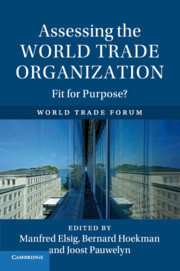Book contents
- Assessing the World Trade Organization: Fit for Purpose?
- Assessing the World Trade Organization
- Copyright page
- Contents
- Figures
- Tables
- Contributors
- Preface
- Abbreviations
- Part I Introduction and Setting the Stage
- 1 Introduction
- 2 Thinking About the Performance of the World Trade Organization
- Part II New Insight from the Early Times
- Part III General Trends and Patterns in WTO Dispute Settlement
- Part IV Zooming in on Specific Debates
- Part V Interactions Within and Across Regimes
- Index
- References
2 - Thinking About the Performance of the World Trade Organization
A Discussion Across Disciplines
from Part I - Introduction and Setting the Stage
Published online by Cambridge University Press: 19 May 2017
- Assessing the World Trade Organization: Fit for Purpose?
- Assessing the World Trade Organization
- Copyright page
- Contents
- Figures
- Tables
- Contributors
- Preface
- Abbreviations
- Part I Introduction and Setting the Stage
- 1 Introduction
- 2 Thinking About the Performance of the World Trade Organization
- Part II New Insight from the Early Times
- Part III General Trends and Patterns in WTO Dispute Settlement
- Part IV Zooming in on Specific Debates
- Part V Interactions Within and Across Regimes
- Index
- References
- Type
- Chapter
- Information
- Assessing the World Trade OrganizationFit for Purpose?, pp. 12 - 42Publisher: Cambridge University PressPrint publication year: 2017



